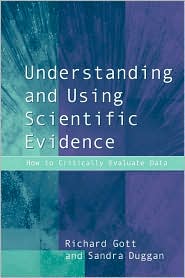

 |

|

The average rating for Understanding and using scientific evidence based on 2 reviews is 3 stars.
Review # 1 was written on 2015-01-03 00:00:00 Beverly Milam Beverly MilamThis is a very interesting, and scary, book. I don't agree entirely with everything in it, but the key arguments make a lot of sense. (Basing a framework on the ideas of a single psychologist is generally a bad idea, but at least he uses Piaget instead of, say, Jung.) Cromer argues persuasively that science is not a natural outcome of human intelligence. Science, the basis of which is objectivity, is a very unusual thing for humans to stumble upon. While many human inventions occurred independently more than once, Cromer shows that science (not technology, which isn't rooted in objectivity) occurred only once, in ancient Greece (and was subsequently kept alive in India and the Middle East before getting back to Europe). The unnaturalness of science is clear to anyone who has tried to teach introductory science classes, or who looks around today and sees a world filled with ideas of magic, religion, parapsychology, and aliens. One natural consequence, of course, is that science can die out. Progress is not inevitable - witness what happened in Muslim countries in the past thousand years, or what happened in Europe in the Middle Ages. Science needs people fighting for it. But science is not exclusive. Everyone who can learn to read can learn basic science. The fact that they don't is a failure of our education system, and of a culture that will happily take gifts from science while never accepting its basis. |
Review # 2 was written on 2012-02-02 00:00:00 Stephanie Lentz Stephanie LentzWhat is science, how did it come about, how is it done, and how should it be taught? Answering these questions, Alan Cromer has written a book that should certainly be read by every science educator. It should also be read by most people interested in the history and philosophy of science as all of these topics are covered. Edward O. Wilson, in "On Human Nature" writes that "No intellectual vice is more crippling that defiantly self-indulgent anthropocentrism." It seems Cromer would enthusiastically agree since a central argument in this book is that human thought is mired in unscientific egocentrism and that it took the specific circumstances of ancient Greece and later Europe to give us science. This stands in contrast to the idea that science inevitably and naturally arises as knowledge progresses. I tend to agree with Cromer that this is incorrect and that it took a specific intellectual climate and historical circumstance for science to develop. Marshalling evidence from the cultures of China, India, and the Middle East where nearly all the ingredients to produce science were present -- such as literacy and mathematics -- Cromer argues that there was nevertheless something vital missing because science did not develop in those cultures. This vital missing element is the rejection of private knowledge or intuition as valid sources of knowledge. This would only come later with the independent European merchant class rediscovering Greek ideas and epitomized by Galileo. My area of scholarly interest is in the cognitive science of religion and so abuts this topic closely. I would say that Cromer's conclusions are fairly sound. Scientific explanations are often counterintuitive while religious and supernatural explanations are often intuitive. It takes conscious effort to master logical and rational thought while nonscientific explanations are often breezily efficient (and just as airy). This is why science doesn't arise "naturally." The main thrust of Cromer's book (published in 1993) seems to bear out under scrutiny. Many of the essays, especially "Knowledge Change in Response to Data" in the book Imagining the Impossible: Magical, Scientific, and Religious Thinking in Children agree with his conclusions. Mentioning that book of collected papers by psychologists brings me to my one serious criticism of "Uncommon Sense": its sparse use of psychological sources to back up its claims. Cromer mainly uses Piaget to support his claims of mental development and egocentrism. While I think he is largely correct, this makes for a weak argumentative case. I'll conclude by quoting a paragraph in the author's own conclusion: "Science is a new factor in human existence that goes against the grain of our egocentric mind. It originated in the democratic practices of ancient Greece, which replaced private dogma with public debate. Based on the heretical belief in an external world that can't be known intuitively, science replaced speculation and faith with reason and observation. Much of our progress, both political and technological, has come from accepting that truth can arise only from the competition of free and informed minds. It cannot be imposed by cannon or canon" (p. 205). On Human Nature: Revised Edition Imagining the Impossible: Magical, Scientific, and Religious Thinking in Children |
CAN'T FIND WHAT YOU'RE LOOKING FOR? CLICK HERE!!!